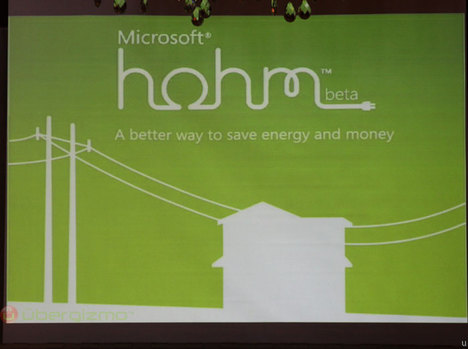
In nine hours, Microsoft will officially announce Hohm, a web-based service that has been created to help people and utilities companies manage energy more efficiently. The official announcement will be made at the Edison Electric Institute utility industry conference, at 9am (PT) on Wednesday.
Hohm works by tracking one’s energy consumption and providing some optimization advices, based on the information that is provided by the user, or by sensors. Hohm will provide an estimation of the savings induced by a proposed change (use different light bulb, choose a different time to plug your electric car ) and will track the actual results after you follow the advice. Hohm will constantly refine its data to provide ever more pertinent advices. Microsoft’s approach is interesting in many ways and here are the highlights:
It’s for everyone
While there are similar efforts out there, some require to have a (somewhat) smart power meter, and that excludes the majority of the population right there. Hohm does not require anything other than a web browser to get started. The setup is quite minimal (an account and 10 questions), so the odds that regular folks will enroll are much higher.
Optionally, it will be possible (next year) to buy smart plugs that transmit consumption measurements directly to your computer (wirelessly) in order to have a much more granular view of your power consumption. Microsoft will work with hardware vendors to make smart plugs as cheap as possible (this is key!), and will also build the software necessary to retrieve the data and remote control some plugs/devices.
The first thing that Hohm will ask is where you live. Energy consumption habits are extremely dependent on local weather and local energy prices, so this makes a lot of sense.
The effort is minimal
The great thing about Hohm is that there is a path that is completely data-entry free. Microsoft has built APIs that let utility companies upload your energy consumption data (with your permission), just like Quicken gets your banking information directly. This could be automated to the point that you don’t have to take care of it. That’s great. However, right now, only a handful of companies will support the direct communication with Hohm.
It should be a sustainable business
The data gathering is the most important aspect of the project. With accurate historical and real-time data, Hohm can become very helpful (and smart) in managing energy on the user side, but also the utility side. Because electricity cannot be stored efficiently, it is very important that it is managed properly and in real-time. Eventually, Microsoft wants to make money by selling data and software to utility companies. In the short term, Microsoft plans to use contextual advertising to generate some revenues with the consumer site. We wonder if Hohm can break-even with advertising, but we’ve heard that this is a tightly run ship.
Conclusion
For more details, you can visit http://microsoft-hohm.com and learn more about the product. We think that the ease of tracking one’s power consumption and the option of having cheap smart plugs all over the house is a winning combination, but remember, the smart plugs are not required. If it works as advertised, and if users enroll in mass, Hohm’s greatest impact in the short term will be to raise awareness. We think that “if it can be measured, it will be improved”, and Hohm seems to be a great tool for that.
Filed in . Read more about Energy and Environment.